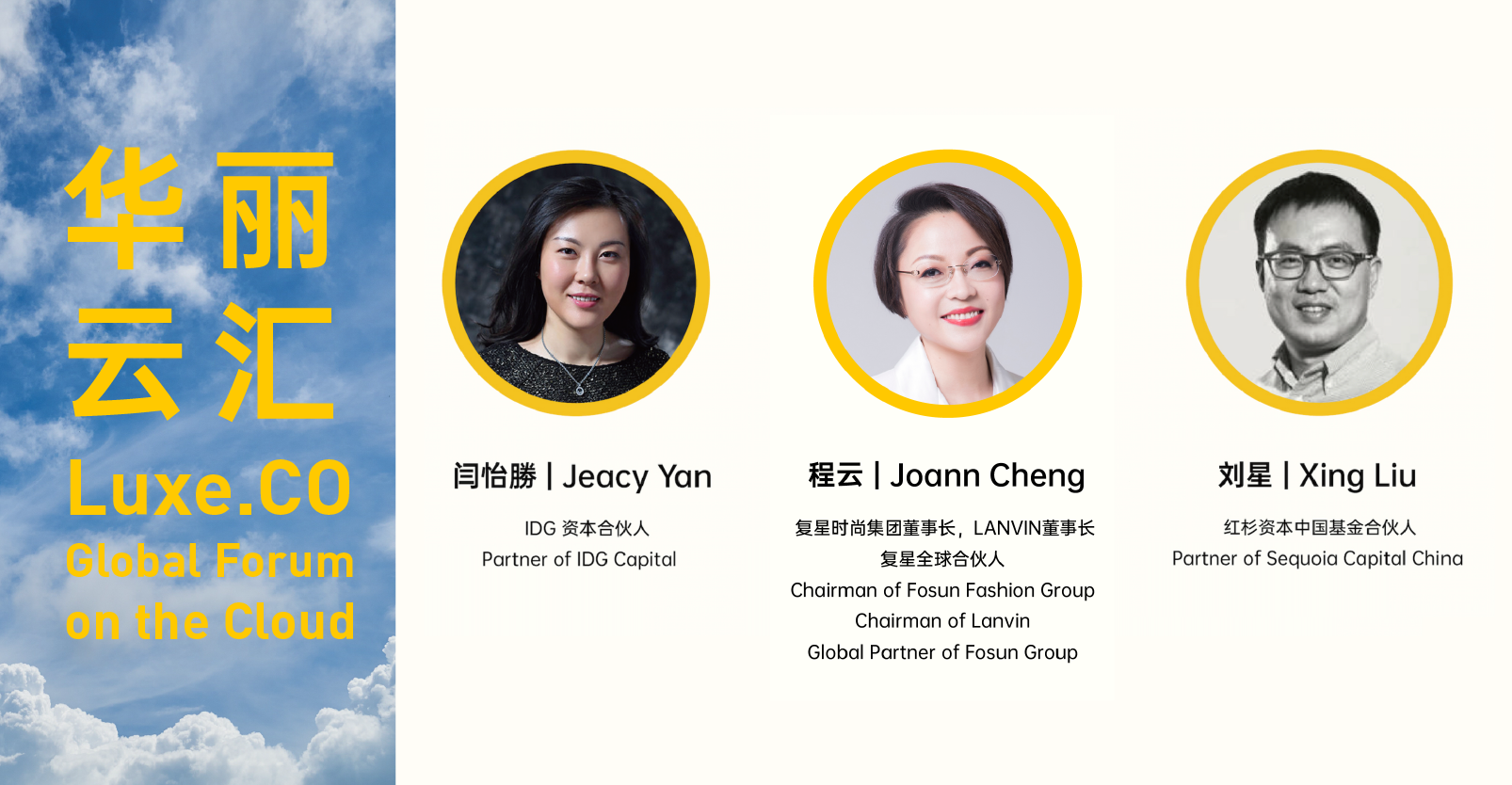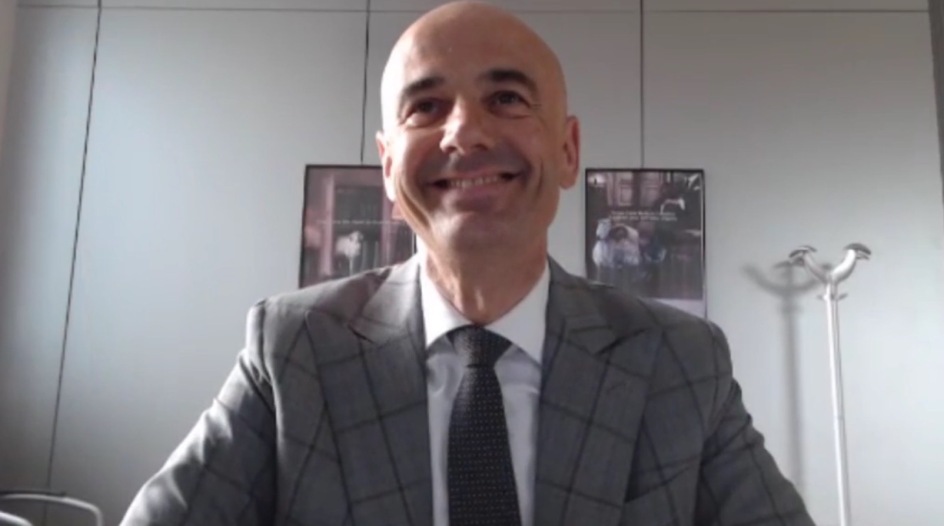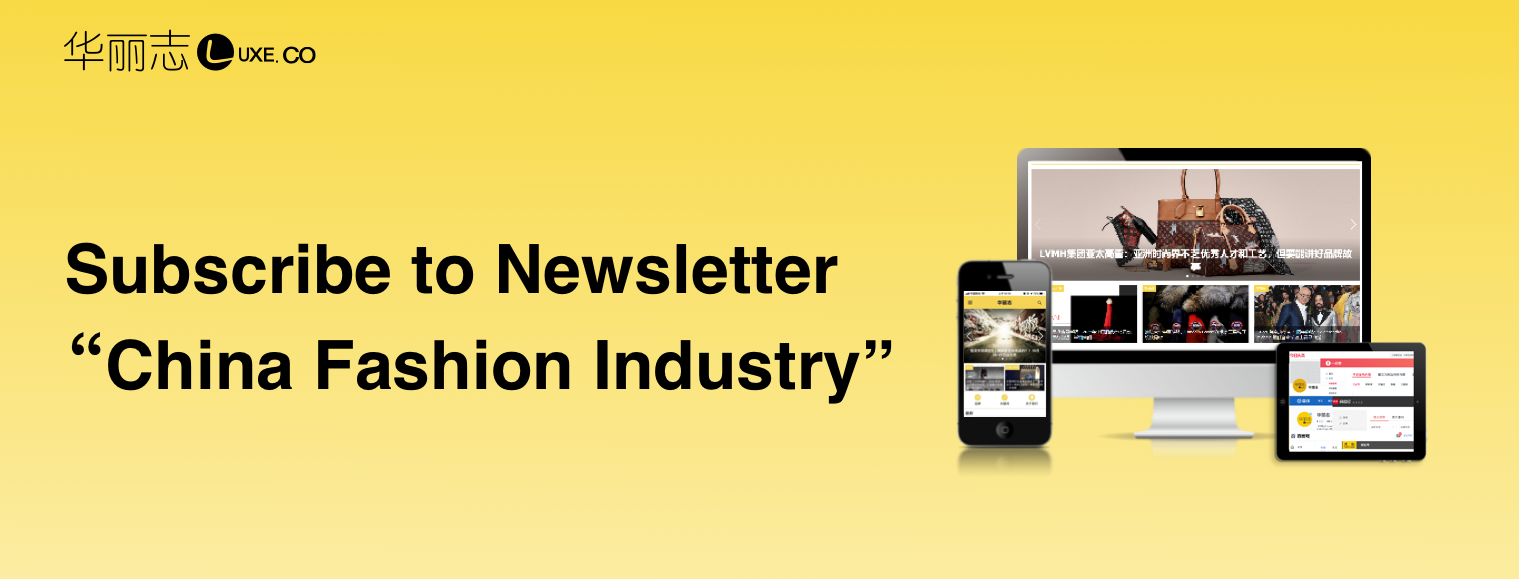Three Partners from IDG, Sequoia Capital, and the Fosun Group Discuss Fashion Investment Opportunities After COVID-19
June 23,2020
- IDG is one of the most active and well-known investment institutions in the field of fashion and luxury goods. It has successively invested in world-renowned brands such as Moncler, Gentle Monster, Rossignol, and ACNE. So, what market insights are behind these transactions?
- As the world's top venture capital company, Sequoia China established a special "Fashion x Technology" equity investment fund last year. How is Sequoia Capital deploying and empowering the Chinese fashion industry, and how will the energy of technology and the magic of fashion be organically combined?
- The Fosun Group is well-known as the Chinese fashion enterprise with the most global vision. After a series of large-scale acquisitions, how will it accelerate the growth of the brand in China and the world?
On the Luxe.CO Global Forum on the Cloud on May 23, Alicia Yu, the founder and CEO of Luxe.CO, successively connected three heavyweight investors in the fashion investment field: Jeacy Yan, a partner of IDG Capital, Xing Liu, a Sequoia China partner, and Chairman of Fosun Fashion Group and Chairman of Lanvin, Joann Cheng, and asked them to talk about their latest insights into the market, investment strategies, and empowerment measures.

Looking Forward to the Future of China's Fashion Industry
Alicia Yu:Т Based on your observation, how has COVID-19 affected the Chinese fashion industry? What are the prospects for industrial development after the epidemic?
Jeacy Yan:Т In the short term, COVID-19 has significantly damaged luxury goods and mid- and high-end consumer goods, especially for companies that mainly focus on offline physical stores. However, in the long run, the epidemic has forced everyone to reflect on the brand's past path, model, and speed of change. After the epidemic, the brand will be upgraded and transformed more quickly, especially in terms of promoting digitalization and using Internet tools to reach consumers, sell and provide after-sales service. The recent high-end trend of the Chinese consumer market will continue after the epidemic. At present, Chinese consumer goods companies have returned to more than 60% to 70% sales, and mid- to high-end consumer demand is also strong.
Liu Xing:Т The Chinese consumer market has reached an upgrade point on both the demand and supply sides, and the outbreak of the epidemic has not changed this long-term trend. On the demand side, the younger generation of Chinese consumers have a better understanding of fashion than the older generation, require more beauty, popularity, and a sense of culture. They are more receptive to either local Chinese fashion, the "National Tide" or the global fashion trend, and their consumer behavior is more mature than the previous generation.
On the supply side, design used to be the weak link in China's fashion industry, but a group of design talents, including Chinese students from several major design schools around the world, have emerged in the field of Chinese clothing accessories in the past few years. Besides, entrepreneurs who are entering the fashion industry now are younger and better, with a significantly improved understanding of fashion, product quality, and ingenuity.
Joann Cheng:Т The greatest impact of the epidemic on fashion brands should be the acceleration of digitalization and the promotion of brandsт use of online tools to optimize the online customer experience. We used to think that the online customer experience was not as good as the offline one because consumers could experience exclusive services in offline stores, such as an explanation of the products, a luxurious atmosphere with music videos, and the opportunity to try-on clothes. Brands need to think about how to enable consumers to enjoy the same high-quality service online during and after the epidemic.
For example, Lanvin of the Fosun Group held a menswear show in Paris in February, 2020, when the domestic epidemic was serious, so that Chinese consumers and KOL could not go to Paris to participate. So, we organized a "cloud show field", which was a novel concept at that time. Moreover, Lanvin and iQIYI presented the first VR cloud watching a show at the beginning of 2020, and consumers could experience the impact of the catwalk at the scene. We completed these two businesses within two or three weeks and have set high demands on the brand's global team.
The brand operation takes time to settle. The epidemic has given us a buffer to construct some infrastructure, such as the brand's official Chinese website and the upgrading of its official overseas websites, as well as the development of a series of online marketing tools and a global supply chain with global grouping and investigation. This is why Lanvin recovered quickly after the outbreak.
[youku width="600" height="350"]https://player.youku.com/embed/XNDY5NjMzNTEyNA==[/youku]
Luxe.CO Global Forum on the Cloud: Fosun Group - Joann Cheng Video Playback
Alicia Yu:Т What are the opportunities for the Chinese consumer industry in the future, especially the fashion industry?
Jeacy Yan:Т Many medium and high-end representative brands have emerged in the past two years in food and beverage, mother and baby, beauty, and other categories that require consumersт trust. These brands have grown very rapidly, and their sales have reached billions, or even tens of billions of yuan.
The share of Chinese brands in the maternal and infant categories, such as high-end milk powder and diapers, is now remarkably high, which was difficult to imagine in the past. In terms of beauty and skincare brands, Japanese and Korean brands at the same price were preferred in the past, while more and more consumers now favor domestic products.
Xing Liu:Т Judging from the overall market size, shoes and clothing are still the largest categories. There are two trends. The first is that the enhancement of the cultural elements of the product and a combination of Chinese elements provides more premium for brands such as PERFECT DIARY, Florasis, and other beauty brands. The second trend is de-branding. The C2M model shows that some groups of consumers do not care much about brands or logos. As long as the functionality, practicality, and cost-effectiveness of products reach an irresistible level, people will think that they are good enough.
Chinese Capital and Overseas Brands
Alicia Yu:Т What is the logic for selecting overseas brands for investment? What are your thoughts on dealing with overseas brands?
Jeacy Yan:Т The representative brands we have invested in over the past two years are Rossignol, a French ski equipment company, and ACNE, a Swedish luxury fashion brand. We invested in Rossignol because we are optimistic about the Chinese ski market. A strong passion for winter sports has been shown from the government to the people as China prepares to host the Winter Olympics. We expect the sales of winter equipment and clothing to rise, just as the sales of the sports market and sportswear rose before and after the 2008 Beijing Olympics. Also, Rossignol has a long historical tradition. It has deeply participated in previous Winter Olympics, and sponsored many athletes. It also has a high reputation among global and Chinese ice sports enthusiasts.
In terms of ACNE, it has very distinctive Nordic characteristics, including minimalism, high-end, coldness, etc., and it is easy to control the design for ordinary people. From the perspective of brand management, brands have maintained a growth of more than ten percent globally in recent years. Besides, ACNE is popular with many celebrities in China who have a certain fan base and a high reputation in fashion circles. The founders of ACNE had the idea of ттselling controlling stakes in early communication, but we were able to show them the potential to develop the entire brand in Asia, especially in China. As a result, the founders have the confidence to continue to control, and we, as the second-largest shareholder, will promote the brand layout in China, together with I.T.
[youku width="600" height="350"]https://player.youku.com/embed/XNDY5NjM2NjA0OA==[/youku]
Luxe.CO Global Forum on the Cloud: IDG - Jeacy Yan Video Playback
Joann Cheng:Т Fosun has actively invested in global fashion and luxury goods in recent years. Representative acquisitions are Lanvin, the French classic luxury brand, and the Austrian high-end personal clothing brand, Wolford.
China has become the main driving force of the global luxury goods market, and the trend of upgrading Chinese household consumption is obvious. These brands have excellent traditions and can provide high-quality products. They have great potential to be developed across the world, but especially in the Chinese market. Fosun can deeply empower the invested brands based on its global family happiness ecosystem and profound industry accumulation.
The key to dealing with overseas brands is still people, because both sides inevitable need to respect and understand each other in the face of differences in national culture. Although cultures may be different, the qualities of excellent companies and entrepreneurs, such as teamwork, attitude, care for employees and customers, remain the same and have become more prominent with the epidemic.
Alicia Yu:Т How does China Capital help overseas brands to layout in China and empower them to grow?
Jeacy Yan:Т Based on our business logic, it is necessary to give play to the brand tradition, genes, and advantages. For example, we assisted Rossignol to establish an independent Chinese branch and a Chinese team. We helped it to establish a direct business In addition to its previous distribution business. Rossignol opened the first batch of offline stores in Beijing TaiKoo Li Sanlitun, Beijing Galeries Lafayette, and Shanghai Kerry Center in November 2019, and a Tmall flagship store in October 2019.
Rossignol has previously established many experience centers and provided training courses in Europe. It also helps teenagers to take part in competitions every year and invites Olympic champions to communicate. The brand is good at the promotion and training of culture and sports.
We believe that this model can be applied to China. In 2019, we cooperated with the Fulong Ski Resort in Chongli, where the Winter Olympics were held, to become its only official designated ski and equipment rental brand, and established an experience center to promote the brand, tradition, and other advantages.
Joann Cheng:Т A two-wheel-drive is an important strategy for Fosun in global brand management. This consists of a Chinese market engine + an overseas brandтs genetic engine, using the global breadth and Chinaтs speed, such as using Chinaтs advanced digital technology to help global brands. The DNA of the brand itself is a valuable asset, which is indispensable. Besides, the power of the product needs to be constantly updated. Since the core of the fashion industry is creativity, we need to spend time every day in polishing the product power centered on creativity. For example, we held a 130th-anniversary exhibition for Lanvin in Shanghai in December 2019, when we reviewed the historical heritage of the brand design directors, Bruno Sialelli and Lanvin, and it was very well received. At the same time, we launched the Chinese capsule series, and built an online private domain.
Alicia Yu:Т From a consumer brand perspective, what are the advantages and disadvantages of Chinese brands compared to overseas brands?
Jeacy Yan:Т The greatest advantage of Chinese brands is that they have a good main consumer group. The acceptance of domestic brands by post-85s, -90s, 95s, and even -00s generations, is very high. Their growth environment is very superior, they accept excellent things from all over the world, and their national pride is very strong. There are no "Foreign things must be better, while Chinese good must be bad" for them. As long as the things you make are different, of high quality, and can resonate with the spirit, they are willing to accept them.
Xing Liu:Т The disadvantage of Chinese brands may be that they do not have such a long history and accumulation of stories as European and American brands, but their advantage is the combination of consumers and technology fields. Especially the power of digital technology has now penetrated all links of the fashion industry chain; for example, at the back end of the industry chain, the use of 3D models to design shoes, collaborative work through algorithmic software, the intelligent transformation of clothing, textile and other factories, adding sensors in fabric factories and garment-manufacturing factories to improve production efficiency, etc.. At the front end, we have also witnessed attempts to optimize consumersт shopping experience based on virtual VR and personalized recommendations.
[youku width="600" height="350"]https://player.youku.com/embed/XNDY5NjQwOTU3Ng==[/youku]
Luxe.CO Global Forum on the Cloud: Sequoia т Xing Liu Video Playback
Promising Chinese Fashion Entrepreneurs
Alicia Yu:Т Have you any suggestions for Chinese fashion entrepreneurs?
Jeacy Yan:Т Chinese entrepreneurs have grown up with Chinese consumers. The new generation of brand entrepreneurs is mainly post-85s and post-90s. Like Chinese consumers, they have a deep international understanding of the brand from a young age, so that the products they make are their favorites and aimed to resolve the pain points that the new generation of consumers has not yet resolved. The brand story and spirit of transmission are close to the new generation of young people. At the same time, if viewed on an international scale, the design or quality of their products is no less than other international brands.
Xing Liu:Т I think that, to succeed in the fashion industry, entrepreneurs must first bear the development rhythm in mind. Since it takes a long time to build a brand, they must not be too eager to achieve success. Entrepreneurs should also be curious, always highly sensitive to market demand, quick to capture changes in consumer behavior and psychology, and rapidly understand and learn to use the power of technology. This generation of consumers require much more from entrepreneurs. The previous generation grasped the "three axes" of dealers, TV commercials, and industrial manufacturing, but that era has already left us.
IDGТ
IDG was the first foreign investment institution to enter the Chinese market and it has achieved a brilliant investment performance. The layout of IDG in the field of fashion and luxury goods is of particular note, since it has successively invested in world-renowned brands like Moncler, Gentle Monster, Rossignol, and ACNE.
Sequoia China
Since it was founded 48 years ago, Sequoia Capital, a world-renowned venture capital firm, has invested in many innovative companies and leaders in industry trends. As the "entrepreneur behind the entrepreneur", Sequoia China focuses on investment opportunities in four areas, namely, technology/media, healthcare, consumer goods/modern services, and industrial technology. Over the past 15 years, it has invested in nearly 600 companies with distinctive technical characteristics, innovative business models, a high growth rate, and high development potential. Last year, it established a "Fashion x Technology" industry equity investment fund.
Fosun Fashion Group (FFG)
The Fosun Fashion Group was established in Shanghai, China, in 2017. It is a multi-industry platform, which is deeply involved in the field of fashion with a Т focus on strategic investment and operations. The Fosun Fashion Group is rooted in China, looking at the world and providing complete solutions for the sustainable development of the brand. The Group believes that it will generate long-term value by implementing a series of strategic initiatives, which include brand building, talent recruiting, product development, strategic alliances, channel expansion, digital construction, and the provision of comprehensive localized operations through its brand operation team, the Fosun Fashion Brand Management Company. The Fosun Fashion Group aims to create and connect multinational communities with its unique operating model and positioning, inspire potential talent, and drive innovation and development. The brands of the Fosun Fashion Group include Lanvin, Wolford, St. John Knits, Caruso, and Tom Tailor.












Comments